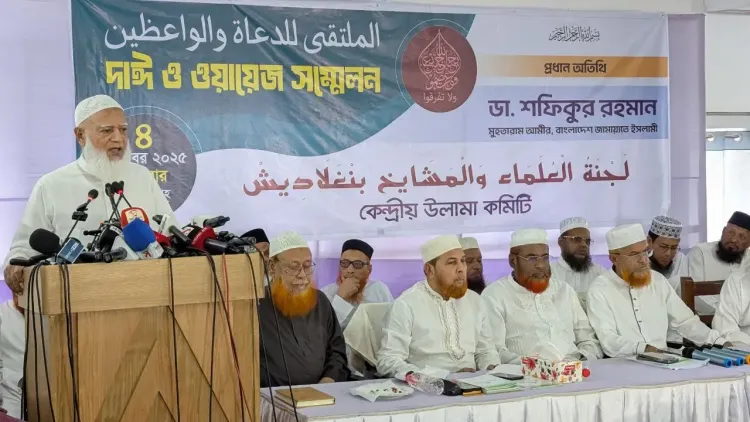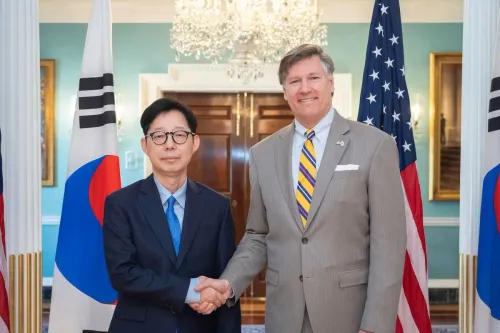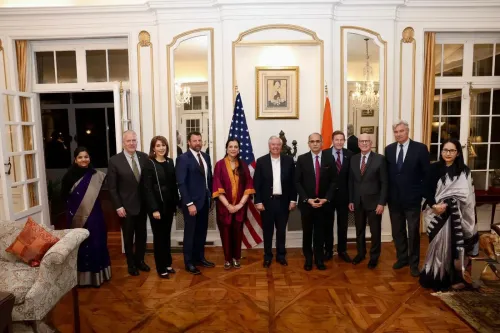Is Bangladesh's Jamaat Party Reinventing Itself?

Synopsis
Key Takeaways
- BJI is rebranding to appeal to a younger demographic and international observers.
- Social media is a crucial tool for BJI's political strategy.
- ICS's electoral success marks a significant shift in student politics.
- BJI's historical associations continue to challenge its rebranding efforts.
- The party aims to address youth unemployment and promote a corruption-free governance model.
Dhaka: Recently, during a members’ reunion (1977-2025) hosted by the Khulna Metropolitan Branch of Islami Chhatra Shibir (ICS), Bangladesh Jamaat-e-Islami (BJI) Secretary General, Mia Golam Parwar, emphasized that now is the opportune moment to send the 'Deen', or the virtuous and righteous, to the Parliament. He urged all former participants in student politics to re-engage actively.
In the past 54 years, Bangladeshi Muslims have seldom encountered such an unexploited opportunity to bring the Islamic Movement to Parliament. It appears that BJI is fully prepared to contest in all 300 seats during the February 2026 parliamentary elections.
On September 25, Parwar reiterated his commitment at a student and youth rally in Dumuria, Khulna district, promising to establish a clean, corruption-free, and humane Bangladesh if his party secures power. He assured that Jamaat leaders would forgo government vehicles and residences upon election and pledged to tackle youth unemployment.
This initiative marks BJI's remarkable strategy to rebrand itself for improved acceptability among international observers and younger Bangladeshi voters following the conclusion of the Awami League's rule on August 5, 2024. The strategy includes symbolic alterations, such as a new, less overtly Islamist party logo, and ideological shifts towards a more liberal and progressive platform.
Recent developments indicate that after the ban was lifted in August 2024, Jamaat-e-Islami Bangladesh has swiftly broadened its digital footprint and social media outreach, utilizing platforms such as Facebook, X (formerly Twitter), Instagram, and Telegram. The party and its affiliates are now exploiting these channels for political mobilization, public messaging, and image management.
BJI is actively enhancing its presence on major platforms by sharing videos and content to attract support. The party also comments on current events, including a viral video from its candidate related to Chittagong University. Their social media accounts disseminate news, party announcements, and showcase interactions with foreign ambassadors and dignitaries. BJI also issues public statements in digital spaces, recently refuting claims of advocating for national division along religious lines.
The party's student wing, Bangladesh Islami Chhatra Shibir (ICS), has played a crucial role in both digital and grassroots campaigns targeting youth. Last month, ICS achieved a historic victory in the Dhaka University Central Students' Union (DUCSU) elections, becoming the first Islamist student group to gain control since 1971. ICS's United Students' Alliance panel secured 23 of 28 positions, including all three top posts. A recent report highlighted Shibir's strategic rebranding efforts, including the inclusion of non-Muslim and hijab-free female candidates to appear more inclusive and politically astute. Furthermore, the party produces content in English to engage a wider audience, including the Bangladeshi diaspora closely following political events back home.
Increased social media activity has empowered BJI to play a significant role in Bangladesh's turbulent political landscape. For instance, during the mass protests in July and August 2024, BJI and its allies were prominent online, contributing to the downfall of Sheikh Hasina's government. This indicates their capacity to leverage digital platforms for organizing and shaping public opinion.
Every public university in Bangladesh is under BJI's influence. From admissions to educational courses, these universities' social media pages guide students while actively promoting BJI's narrative.
Social media platforms greatly influence public discourse, often utilizing algorithms and bot accounts. Typically, Sadiqur Rahman Khan operates the bot from the Jamaat side, while Hasnat Abdullah and Sarjis Alam of the National Citizen's Party (NCP) regularly share his posts. Digital platforms dictate which topics are deemed 'trending' or 'popular,' granting them substantial power to amplify specific narratives while allowing others to fade away. Both positive and negative narratives emerge, often driven by agendas to achieve particular outcomes, irrespective of their truth.
Consistent pressure from the US and West has compelled BJI to adopt a more moderate stance by removing hardline Islamist symbols. Additionally, shedding its extremist image is a strategic move to secure funding from the Bangladeshi diaspora in Europe, West Asia, and Malaysia without attracting scrutiny related to international terror financing. BJI's calculated rebranding efforts, aided by external players, raise concerns for India. Cosmetic changes cannot erase BJI's troubling historical role.
It is essential to note that Muhammad Yunus contributed to the consolidation of power for BJI and other radical Islamist parties during his tenure as Chief Advisor. Following his rise to power in August 2024, the interim administration lifted bans on BJI and ICS, also releasing a leading BJI figure convicted of war crimes.
(The author is a specialist on South Asia and Eurasia, previously associated with the Manohar Parrikar Institute for Defence Studies and Analyses. The opinions expressed are personal.)










